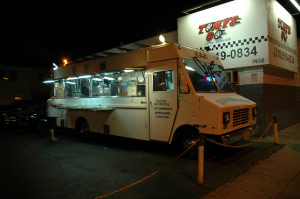Tax collectors bite taco trucks
By Steven Greenhut
SACRAMENTO — We all would laugh at a man who, sinking in millions of dollars in house payments, car loans and credit card bills, decided to fix his cash-flow problem by looking for nickels, dimes and quarters lurking underneath the sofa cushions.
Likewise, we should shake our heads at the way the state of California — groaning under a budget deficit approaching $16 billion and hundreds of billions of dollars in unfunded pension and retiree medical benefits — is stepping up tax collection to help plug a hole caused by its chronic overspending.
I met Tuesday in Santa Ana with about 12 owners of catering trucks — mobile eateries that sell mostly Mexican food — and they told a disturbing tale of how the state’s Orwellian-named tax agency, the Board of Equalization, is targeting and mistreating them. The business owners assembled in the room blamed their tough times more on state tax authorities than on the economy.
The truck owners say the state is handing them tax bills for tens of thousands of dollars, based on unrealistic estimates of their taxable sales. When you buy food at the trucks, a burrito and Mexican-bottled Coca-Cola (the kind with real sugar, rather than the icky corn syrup) may cost, say, six bucks. That’s all you pay, as opposed to a restaurant, where state tax would be added onto the transaction. The trucks don’t collect a per-item tax, but owners later estimate their sales and send their money to the tax man.
Unrealistic estimates
The BOE, truck owners say, used to tax them based on realistic sales estimates and used to account for the fact that many of the items they sell are nontaxable. They say the BOE also used to work with them to make their tax bills and treated them respectfully.
No more.
Desperate for cash, state officials now concoct unrealistic estimates of food sales and employ heavy-handed tactics, the truck owners said.
To make matters worse, the truck owners say police harass them — due, in part, to city officials who don’t like having the trucks around. Every city has different rules for placement of permits on the truck, and most of the owners report getting multiple citations for minor infractions. Each citation can cost $700, which can eat up days’ worth of taco sales.
The people I met with spoke mostly Spanish, which was translated for me by Lou Correa, the Santa Ana Democratic state senator who organized the group at my request. I promised to print only the first names of the attendees because of their fear of retribution from authorities.
“It reaches the point where you have to think about your health,” said Veronica. “They filed lawsuits against me. They said they would charge me as a criminal in court. I’m out of business. I sold my truck. There are people out there who get government aid who are driving brand new cars. They come after a person like me, who is not asking for anything. As long as I have two feet and two hands, I want to work.”
Welfare
Officials suggested to one truck owner that he apply for benefits from the welfare office. That’s just like California these days — hardworking people are ill-treated, but there are plenty of benefits available for those who prefer to live on the dole.
Many of those I met with told stories of long waits, complicated audits, confusing instructions, unhelpful officials, of bureaucratic indifference. Some also said the state tax agency reports violations to the IRS, which they say, can trigger a federal tax audit.
Those who work other jobs have their wages garnished to pay the state.
“We were paying an acceptable amount, and then the state needed more money,” Gilberto said. He told me that this is a group of mom-and-pop business owners who cannot afford attorneys and accountants.
I talked to the Board of Equalization’s Michelle Steel, the elected official who represents Orange County on the tax agency. She promised to pull the records of the truck owners and see what can be done to help them.
At the gathering in Santa Ana, one man blurted out the word “pensions.” Everyone laughed. In English or Spanish, these business owners understood that the state is shaking them down for money to pay for its reckless overspending, on programs including six-figure pensions for many government employees.
Concern for the poor
The state Capitol is controlled by liberal Democrats, who frequently invoke concern for the poor, working-class people and immigrants to justify spending schemes. Yet here is another example of how these officials, lawmakers and bureaucrats, put the demands of the well-paid and powerful public-employee unions over the needs of cash-strapped immigrants and working people.
State officials refuse to tackle solutions for the pension debt or rein in public spending. Indeed, they are busy approving fanciful projects such as high-speed rail. Yet, the state has no money. This is the end result of an infantile progressive movement that refuses to make hard choices, always blames the private sector and figures that higher taxes will solve every problem.
Sen. Correa also planned a meeting with owners of nail salons, who say they are being targeted by state regulators for large fines based on picayune regulatory violations.
I’m not arguing that small businesses shouldn’t pay their fair share of taxes or comply with reasonable rules, but it’s a sad day when the state government treats them like criminals – or like a piggy bank.
Read those surveys of business owners, including at least one that ranked California last in the nation in terms of business friendliness. The owners don’t complain so much about the state’s high tax rates, but about the prevalent attitude in which they are treated with hostility by authorities.
I love California. But if I depended on a catering truck for my living, I’d fill it up with my belongings and drive to Nevada.
Related Articles
Lawsuit could bring ‘social justice’ to adult-first K-12 school districts
The left in California has been slow to understand that having a state government devoted to the interests of the
Warrantless drone ban hovers over Brown’s desk
With a stroke of his pen, Gov. Jerry Brown could set the tone for state-level drone policy. After passing the Assembly
Live Like You’re A Liberal
MARCH 20, 2012 Songs and books have been written about the importance of living every day as if it will





